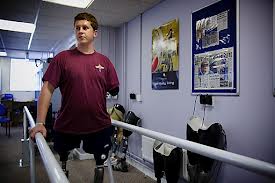If the roots of the Olympic Games can be traced back thousands of years to the ancient Greeks, then the Paralympics is of rather more recent vintage and its origins lie rather closer to home; in Buckinghamshire, to be precise.
For it was in 1948 at the Stoke Mandeville Hospital that Dr Ludwig Guttmann, an expert in helping rehabilitate injured service personnel, especially those with spinal injuries, organised an event for those hurt during World War II. The first International Wheelchair Games coincided with the start of the now last-but-one Olympics to be held in London. The rest as they say is history and by 1960 in Rome Dr Guttmann’s vision had evolved into the inaugural Paralympics. The 400 disabled participants came from all walks of life and were not just injured servicemen.
But here’s the irony. Given the genesis of the Paralympics it will surprise many, and shock some, to learn that just six members – two per cent – of the current Great British team are from the armed forces.
To be blunt, it isn’t as if there isn’t a deep pool of prospective talent. Since the start of 2006, 281 UK personnel have been categorised as being very seriously injured in Afghanistan. 289 others seriously injured. Before ‘Afghan’, was Iraq. For Operation Telic the figures were 73 and 149 respectively.
Most of these people will have been young, extremely fit, immensely courageous and steely-willed. And as an organisation the military puts sport very much at the heart of their activities and they support all abled and disabled service personnel achieve the highest levels possible in numerous sporting activities.
So why will so few of them be competing in 2012? Is the MOD disinterested and failing to carry the flame for an institution it itself helped bear and nurture? Or is there something else that precludes participation of the very people one would want on the team sheet?
Despite first sight of the evidence it is probably the latter.
The numbers demonstrate the balance of casualties have occurred in the last half decade or so. Advances in equipment and battlefield medical provision mean that many of these troops survived injuries which in previous conflicts they would not. Yet it also means more soldiers, sailors and airmen than ever before are left facing the future with life changing injuries, a euphemism for terrible wounds which require years of treatment. Many have lost one or two limbs, brain damage, loss of sight and groin injuries are also common. The road to some degree of adequate recovery is long and arduous.
Occasionally it is all but impossible. Demonstrating the difficulties a good friend and close colleague was seriously wounded in 2008 when his vehicle went over an IED, this would have been as the last Paralympics was coming to an end. Four years later he still wears a cage around his left leg, shattered by the blast. Even now there is no guarantee that he will not lose the limb but his fight is no less a fight than those chasing Olympic glory.
Clearly there are wounded colleagues who notably and publicly achieve immense feats of endurance: reaching the poles, trekking to Everest, learning to ski, sail and cycle. They are truly inspirational role models, but for the majority of those who have been hurt the challenge is not to travel to the ends of the earth or to climb mountains, but simply to get to the end of the road under their own steam or ascend the stairs in a home designed for the unimpeded. Their lives are not moulded by four-year training cycles but constant hurdles over which they must leap merely to reach the end of each day.
Nor is youth, for those who possess it, a single-edged sword, for their bodies continue to mature. Cleaved bones keep on growing.
None of which is to say that future Paralympics teams will not be packed with service people. But first, almost to a man, those with injuries want to stand on their own two feet. The great depths of pride and courage they possess drive them on to try and regain their independence and, crucially, to regain their place in the military family as equals.
Winning a gold medal is one thing, retaining the admiration and respect of colleagues is quite another. And it is these things which the professionals at the MOD rehabilitation centre at Headly Court focus on, helped on by the immeasurable contributions from charities like Help for Heroes, The Royal British Legion and the Army Benevolent fund just to name a few.
For once a soldier, always a soldier and nowhere is this best demonstrated than with Lance Corporal Ben Parkinson.
Horrifically maimed in 2006, Ben carried the torch through his home town of Doncaster ahead of the able-bodied games, not from a wheelchair, but walking tall as a soldier who serves in the British Army. And he is not alone; the number of soldiers who return from operation in Afghanistan without limbs yet fight to stand with their colleagues to receive their operational medals is also inspirational.
The motto of the Paralympics is ‘Spirit in Motion’. It could be said that Ben and his colleagues exemplify this sentiment day in day out, not just every four years.




Reblogged this on madeinulster's Blog.